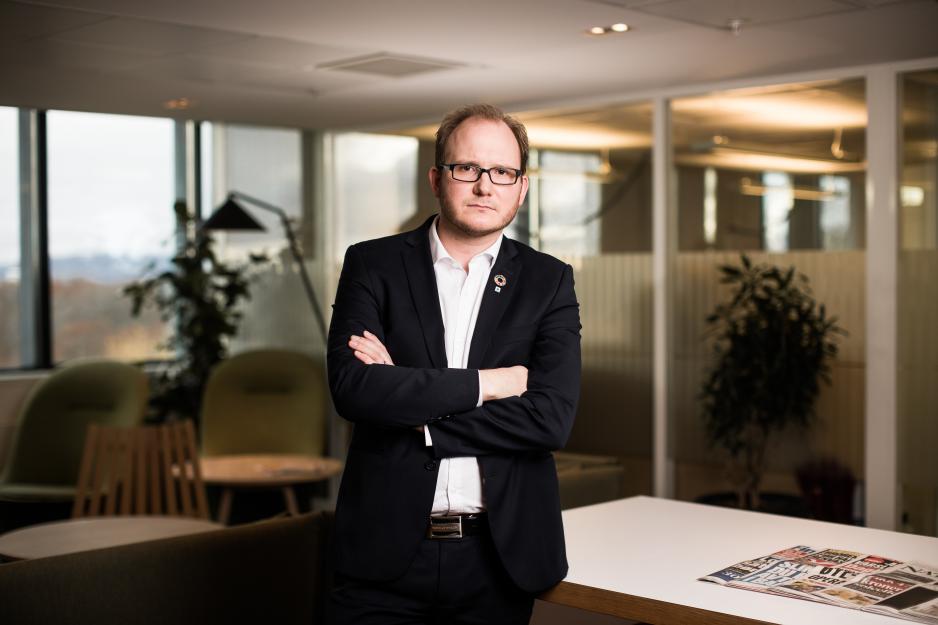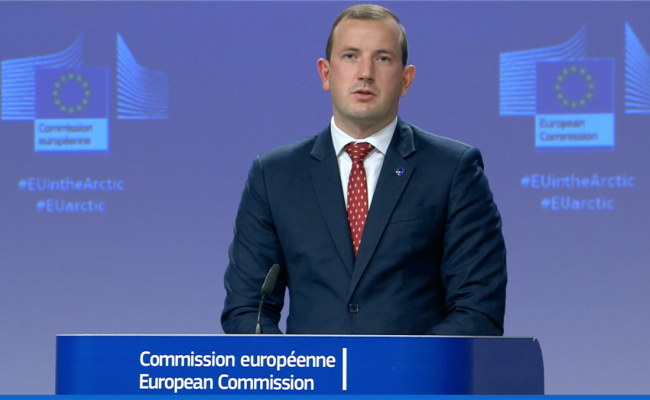Argues that the Arctic Cannot Mitigate the EU’s Black Environmental Conscience

NHO, the Confederation of Norwegian Enterprise, has over time lobbied the EU for a development rather than moratorium stance. Daniel Bjarmann-Simonsen is Regional Director of NHO Nordland. (Photo: Eva Helene Storm Hanssen)
The EU wants to put an end to exploitation of gas, oil and coal in the Arctic. “It is good that they have abandoned the moratorium stance on all activities, however, they fail to hit the target when it comes to what is needed to reach the goal about sustainable development in the High North”, says Regional Director of NHO Nordland Daniel Bjarmann-Simonsen.
The EU Commission asks for an international moratorium on the exploitation of hydrocarbons in the Arctic and requests that oil, coal, and gas remain in the ground prior to the UN Conference on Climate Change and in support of global climate measures.
“The Arctic is changing rapidly, owing to the impact of global warming, increased competition for natural resources, and geopolitical rivalries”, said Josep Borrell, the EU High Representative of the European Union for Foreign Affairs and Security Policy, and Vice-President of the European Commission, when the Commission Wednesday presented its new Arctic strategy.
Regional Director of NHO Nordland Daniel Bjarmann-Simonsen says the Commission’s statement came as a blow.
“We have over time lobbied the EU for a development rather than moratorium stance. And we have received positive feedback about it and can see traces of that here. It is good that the EU has abandoned its overall moratorium stance, however, the union fails the target when it comes to what is needed to reach the goal of a sustainable development in the High North”, Bjarmann-Simonsen says and adds:
“Initially, this is just symbolic from the EU today and will have little effect. However, it points to a direction and speed and could become regulatory tomorrow. That might mean regulations that prevent importing gas from Northern Norway to the EU. Thus, Norwegian authorities must be on the ball. The new [Norwegian] government is fortunately very clear about two things in its founding document. It wants an active business and development policy for the country’s most important strategic area, the Arctic. It also wants to conduct an active European policy in order to affect it to the best possible benefit of the country. This is an excellent combination now that the EU has passed this giant challenge on to the new ministers Støre, Barth-Eide, Vestre and Huitfeldt. They should just get to work. And we will contribute.”
That might mean regulations that prevent importing gas from Northern Norway to the EU. Thus, Norwegian authorities must be on the ball.
Should not climate scientists be listened to?
“We here in the north cannot be given the main responsibility for mitigating Europe’s black conscience when it comes to climate changes. The High North is part of the solution, which shows in everything from hydrogen production in Berlevåg, via hydrogen burner cells in Narvik, to battery production in Berlevåg and carbon nanofibers based on CO2 captured from aluminum production in Mosjøen. But like the rest of Norway and the world, we stand on the shoulders of the industries we have. Building on that is ital when we are to create new, green industries in the Arctic. Several oil and gas companies currently operating offshore in Northern Norway are involved as partners n new, green projects in the region. That demonstrates very clearly that they have already started transforming into becoming broader energy companies.
An oil spill in the Arctic would have disastrous consequences. Is it worth taking the risk?
“Saying that the High North shall be a region with no fossil fuel industry in the transition of the Green Shift is a short circuit, for two reasons. The first is that the climate crisis is global. If there were to be an emission in the Mexico Gulf, it would be as damaging as one off the coast of Northern Norway or in the Barents Sea. However, unlike in the Gulv, production emissions are far lowere here in the Arctic”, says the regional director. He continues:
“Besides, we have the best HES in the world. Secondly, the value chains are as connected here as they are in the rest of the world. If you remove one element, it affects all the others. If you remove the oil and gas industry too fast, the supplier industry in for instance Sandnessjøen or Hammerfest loses jobs and risk not having enough muscle to partake in the new industrial ventures, such as wind power at sea. This, in turn, means loss of jobs and wealth creation, which is what builds our welfare. Not to mention that it would be the perfect way of destroying viable communities in the High North. Climate change is best displayed in the Arctic, yet they are not solved through destroying communities here.”
The entire document describing the EU’s new approach to the Arctic can be found and read here.
Also read
This article was originally published in Norwegian and has been translated by HNN's Elisabeth Bergquist.


